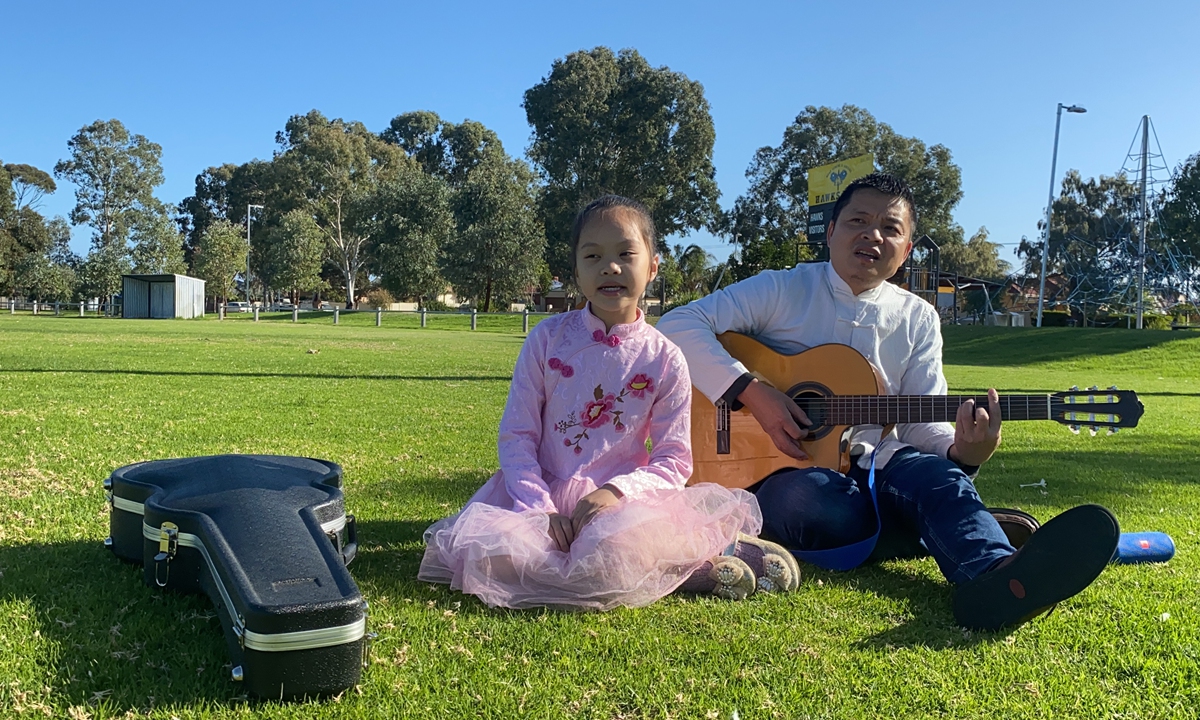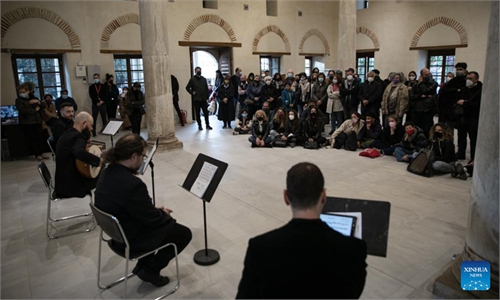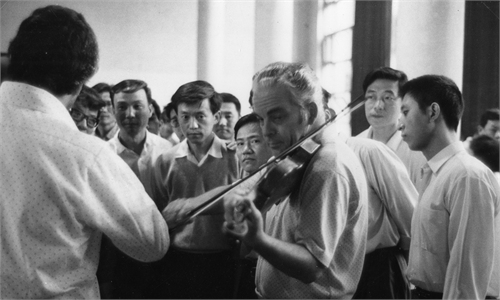ARTS / MUSIC
Teacher in Australia merges ancient Chinese poetry with modern music
The right mix

Abao (right) and his daughter Emily sing on the lawn. Photo: Courtesy of Abao
Serenading his daughter Emily in front of a camera with a guitar, Abao and Emily sing a renowned Chinese ancient poem song, whose music was composed by him. The song's lyrics are familiar to most Chinese people, as they are from one of the most well-known ancient poems "A Tranquil Night" by the great Tang Dynasty (618-907) poet Li Bai.Abao, a Chinese teacher working at a public school in Australia, has set more than 60 ancient Chinese poems to music, the universal language of the world, so his students can better appreciate these ancient works, considered the cream of the crop of the traditional Chinese culture.
The teacher told the Global Times that the method has proven popular among these young people coming from very different cultural backgrounds.
It was not an easy journey to figure out the best way to put these poems to music. Abao noted that Chinese is a language of melody, while English is a language of rhythm, so how to make native English-speakers understand both the tone and meaning of these ancient poems was a challenge.
"The idea of my creation is to use Western music as a framework for the traditional Chinese poem, so that the Chinese tones and the melody can be very integrated. Chinese people feel that it is very fresh, and children who grew up here can also accept it. These works have Chinese classical beauty," Abao added.
Capturing young hearts
"O geese, O geese, O geese! You crane your neck and sing to sky your song sweet. Your white feathers float on green water with ease. You swim through clear waters with your red-webbed feet."
This poem written by the Tang Dynasty poet Luo Binwang is often included in elementary school textbooks in China. Abao also included the ancient poem in his class after composing music for it.
"I used reggae music to edit the song as the poem itself is lively and child-like," Abao said.
The bright tone and rhythm captured the young students' interest, so Abao also added some moves that go with the meaning of the lyrics.
"They like singing the song every day at school."
Through the teacher's endeavors, these non-native speakers of Chinese can sing some of China's ancient poetry by heart.
Born in South China's Guangxi Zhuang Autonomous Region, Abao is a member of China's Zhuang ethnic group, which has a strong tradition of singing and dancing. On a more personal level, Abao gained a keen interest in music as a child after he saw his older brother playing guitar.
The seed of obsession with music helped Abao establish a teaching method that has proved effective both at home in China and in Australia in getting students to fall in love with traditional Chinese culture and making language learning easier.
Growing up, Abao learned how to play guitar on his own. When he began teaching at Guangxi University as an English teacher, he began to sing and play English songs with his guitar to assist students to learn the language.
In 2010, Abao got a chance to go to Boston to teach Chinese. During that time, he used his experience of teaching English to help his US students better understand Chinese. There were some challenges too. For instance, some words in Chinese are pronounced quite differently while singing.
"I had to pick songs whose melodies match tones well like the works of Lo Tayu," Abao said, explaining that he researched hundreds of Chinese songs to find the right ones for his class.
Finally, Abao was inspired to come up with his own method that allowed the Chinese language and Western musical styles to merge.
Beauty of poems
"Abed, I see a silver light, I wonder if it's frost around. Looking up, I find the moon bright; Bowing, in homesickness I'm drowned."
The song adapted from "A Tranquil Night" by Li Bai is one of the most popular works Abao has composed. He not only completed a Putonghua (Standard Chinese) and English song versions of the poem, but also a Cantonese version.
"Our ancient poems can bear the weight of human feelings, no matter what language they are translated into," Abao noted. He added that these feelings, like the homesickness contained in Li's poem, are common for people around the world, and so they can easily resonate with people.
Abao edited the three versions of "A Tranquil Night" into a video that he then uploaded to social media platforms. The video was applauded by netizens both in China and abroad.
Some parents left comments under the video encouraging Abao to create more of these works.
"Ancient Chinese poems are so beautiful. Please write more songs for these poems so that I can have more education materials for my children and help them learn Chinese culture," one YouTube user wrote.
Abao said his next plan is to write more songs about ancient Chinese poems and organize his Australian students to complete a stage musical that narrates a story through these poems.
"That will be very stunning," he said




